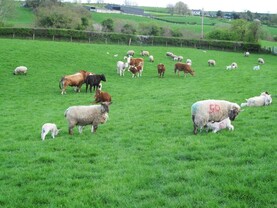There has been an increase in the number of calves born with bovine viral diarrhoea (BVD) in NI.
The latest figures show that in May 2020, the animal prevalence rate stood at 0.31%, which is slightly higher than the same month last year. It means that for every 1,000 calves born, three tested as positive for BVD.
According to Animal Health and Welfare NI (AHWNI), the body that administers the BVD eradication programme, the rise is mainly down to several significant outbreaks in suckler herds.
It stemmed from BVD-positive calves running with pregnant cows which led to a spike in persistently infected (PI) births the following year.
Outbreaks within an individual farm also increase the risk of BVD passing to neighbouring herds.
With most herds now free of BVD for several years, unvaccinated cattle have no immunity, and are more susceptible to the disease once it is re-introduced.
“Some reasonably large outbreaks have bubbled up in certain areas. Farmers need to be aware that BVD is still out there and it can still cause significant issues in their herd,” said Dr Sam Strain from AHWNI.
Other routes of infection include movements of BVD positive cattle, such as cows that are carrying an unborn PI calf, or cattle that have a
Read more
16,000 NI cattle with BVD status unknown
Plans to ramp up NI BVD controls
There has been an increase in the number of calves born with bovine viral diarrhoea (BVD) in NI.
The latest figures show that in May 2020, the animal prevalence rate stood at 0.31%, which is slightly higher than the same month last year. It means that for every 1,000 calves born, three tested as positive for BVD.
According to Animal Health and Welfare NI (AHWNI), the body that administers the BVD eradication programme, the rise is mainly down to several significant outbreaks in suckler herds.
It stemmed from BVD-positive calves running with pregnant cows which led to a spike in persistently infected (PI) births the following year.
Outbreaks within an individual farm also increase the risk of BVD passing to neighbouring herds.
With most herds now free of BVD for several years, unvaccinated cattle have no immunity, and are more susceptible to the disease once it is re-introduced.
“Some reasonably large outbreaks have bubbled up in certain areas. Farmers need to be aware that BVD is still out there and it can still cause significant issues in their herd,” said Dr Sam Strain from AHWNI.
Other routes of infection include movements of BVD positive cattle, such as cows that are carrying an unborn PI calf, or cattle that have a
Read more
16,000 NI cattle with BVD status unknown
Plans to ramp up NI BVD controls






 This is a subscriber-only article
This is a subscriber-only article








SHARING OPTIONS: